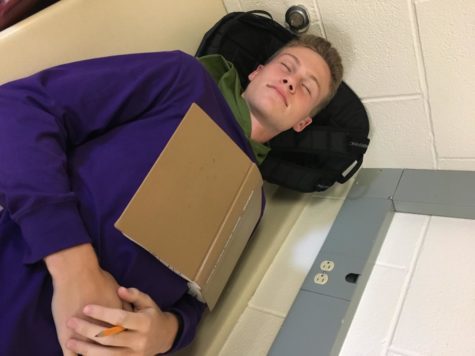Would School Starting Later be a Great Change?
October 6, 2017
Beep! Beep! That’s the alarm going off again at 6 am every weekday for most of the next 9 months. With school starting at 7:16 am, students at Milford High School have to get up at an extreme time to get ready to go to classes until 2:02 pm. There’s no way to avoid waking up that early to go to school unless some change is made.
Recently, schools in California passed a bill, SB-328, saying that any middle school or high school in the state can’t start school until 8:30 a.m. based on studies done by the National Sleep Foundation stating that teens that do not get enough sleep have problems focusing and staying awake for all aspects of what they have to do during the day. The study also showed when a student goes to bed at a later time, it affects his or her sleep patterns causing them not to get very much rest. Because of this, students are more prone to getting into more car accidents because they are still half asleep. Keeping students safe are what schools try and do, yet they let them drive to school barely awake enough to see the street lines.

Milford High School is keeping students going all day. As junior Nathan Johnson said, “I usually don’t go to bed at midnight or later, usually by the end of the day I’m feeling pretty tired.” Also with the amount of homework given to students, most don’t fall asleep until midnight. An article in the Wall Street Journal by Dr. Tara Parker-Pope states that less sleep affects a student’s emotional state as well. Kids were either misdiagnosed with having ADD (Attention Deficit Disorder), depression, or behavioral problems and were given prescription drugs when all they needed was more rest. These problems could be avoided with a little more rest.
SB-328 was passed in California based on the data and studies performed by major organizations like: the Centers for Disease Control and Prevention, the American Medical Association, and the Start School Later coalition (a nonprofit formed of health professionals and educators). The National Sleep Foundation, another organization that helped with SB-328, found that students who got more sleep performed better in all aspects of school. There w
ere also less car accidents caused by teen drivers. Their grades improved, they participated more in class, and they performed better in their extracurriculars and jobs as well.
Even the American economy would benefit from schools starting later.The decrease of car accidents and students with higher academic performance would eventually improve economic production. A study from the RAND Corporation shows moving school start times to 8:30 a.m. or later would add $8.6 billion dollars to America’s economy two years after the switch. That money would lead to more tax revenue, which could be put back into the schools for books, equipment, and facilities. A later start time would benefit everyone and the economy if all schools across America would pass a bill like SB-328.
The information and data provided all points towards a later start time. Students sleep patterns are being affected, which affects their work in school, sports, work, etc., and it affects their personality and emotional state. The change can give better grades, more energy and focus in school, and even give the economy money that could be put towards school needs. The big question is could Michigan make this happen like California did? Students can push their school boards to see the benefits of this info and send it to our state representative which could eventually lead it to the state legislature. If the bill reaches them, then more sleep could be in reach. Hopefully, not just students of Michigan can make changes, but all of America can see that California is making a significant move for our future and can strive for the same goal they did.